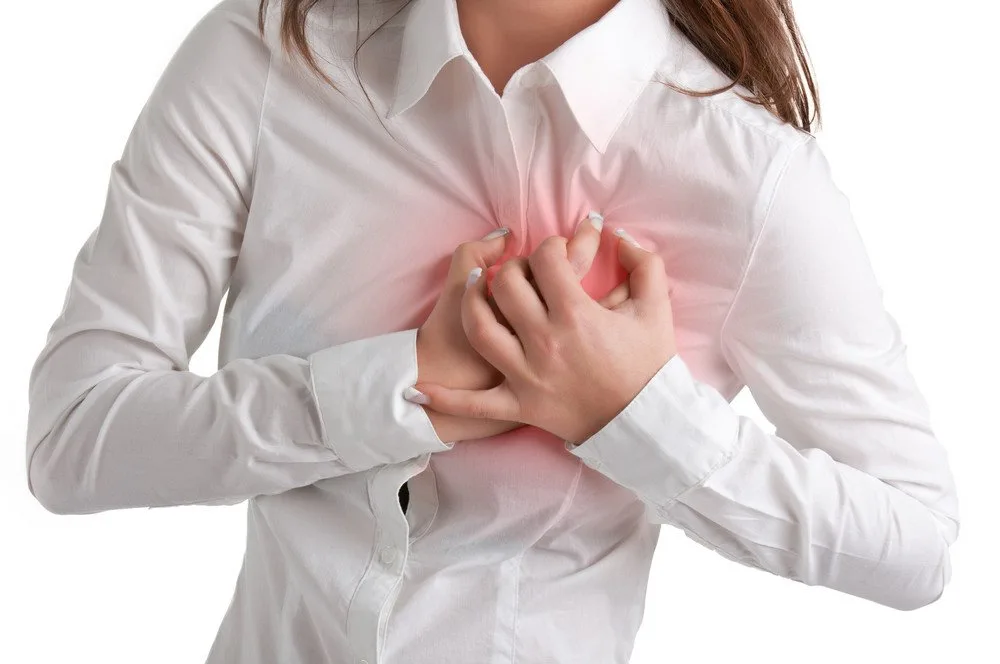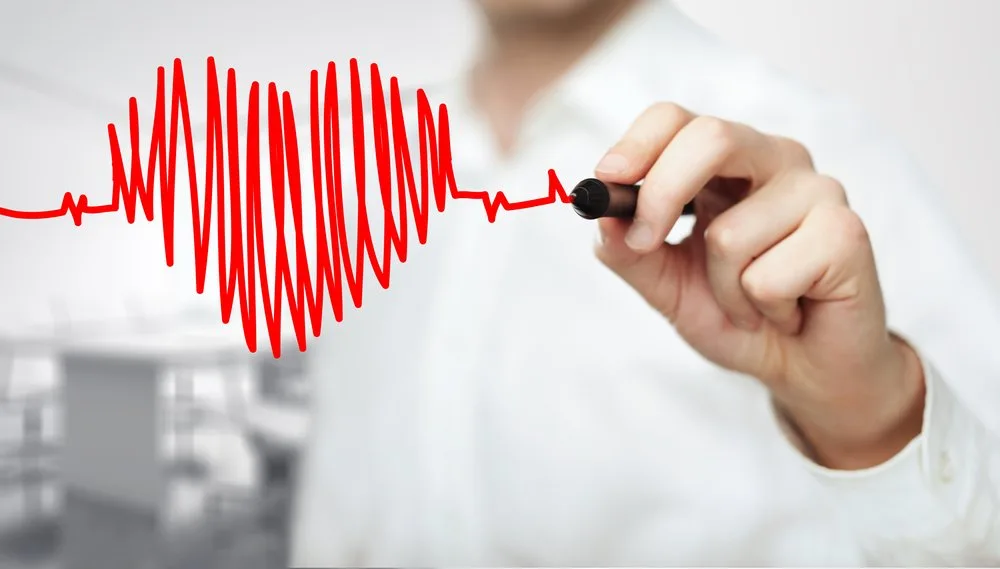29 September marks World Heart Day when the global spotlight falls on all things relating to heart health (1).
One often overlooked, yet very common heart condition, is angina, a type of chest pain caused by reduced blood flow to the heart, and a warning sign that something may be wrong. However, over the last decade, angina has changed its face with many patients suffering atypical angina, resulting in frequent under-recognition by doctors and putting an increased burden on society.
What does angina feel like?
Angina is an uncomfortable feeling that may include tightness, heaviness, or pain in your chest, which may spread to your arms, neck, jaw, shoulders, back, or stomach (2).
People sometimes describe the feeling as a dull ache. The symptoms are not the same for everyone. Some people feel the pain or tightness only in their arm, neck, stomach, or jaw. For others, the pain or tightness is severe, while there are those who may feel nothing more than mild discomfort or pressure.
You might experience angina on a cold day, or if you’re walking after a meal. Being terribly upset can sometimes trigger an angina episode, or you may get angina if you’re exerting yourself – for example, during exercise.
Other symptoms of angina may include dizziness, fatigue, nausea, as well as shortness of breath and sweating.
The symptoms of angina usually fade after a few minutes’ rest, or after taking medication that your doctor may have prescribed.
Although angina is relatively common, it can still be hard to distinguish from other types of chest pain, such as the discomfort of indigestion. If you have unexplained chest pain, it’s advisable to seek medical attention right away.
The symptoms need to be evaluated immediately by a doctor who can determine whether you have stable angina, or unstable angina, which can be a precursor to a heart attack.
Stable angina
You may have angina that comes on with a particular amount of activity but resolves quickly with rest, is well-controlled with medicines, and doesn’t become more frequent or more severe. This is known as stable angina.
Characteristics of stable angina
- Develops when your heart works harder, such as when you exercise or climb stairs.
- It can usually be predicted and the pain is usually similar to previous types of chest pain you’ve had.
- Lasts a short time, perhaps five minutes or less.
- Disappears sooner if you rest or use your angina medication.
- The severity, duration, as well as type of angina can vary. New or different symptoms may signal a more dangerous form of angina (unstable angina) or a heart attack.
Unstable angina
Unstable angina is when you have symptoms that you have developed for the first time or angina which was previously stable but has recently got worse or changed in pattern. For example, your angina symptoms may come on after doing much less activity or with less stress than usual, and may even come on while you are resting.
Characteristics of unstable angina (a medical emergency)
- Occurs even at rest
- It’s a change in your usual pattern of angina
- Is unexpected
- It is usually more severe and lasts longer than stable angina, maybe 30 minutes or longer
- May not disappear with rest or use of angina medication
- Might signal a heart attack
What causes angina?
The most common cause of angina is coronary heart disease. There are certain things about your lifestyle or family history that mean you may be more likely to get coronary heart disease. These are known as risk factors. You are more likely to get coronary heart disease if you:
- Have high blood pressure.
- Smoke any form of tobacco.
- Have too little physical activity.
- Are overweight or obese.
- Have diabetes.
- Have a high blood cholesterol level.
- If you have a family history of premature heart disease. (this means if your father or a brother has, or had, angina or a heart attack before the age of 55, or if your mother or a sister has, or had, angina or a heart attack before the age of 65.)
Preventing angina
You can help prevent angina by making the same lifestyle changes that might improve your symptoms if you already have angina.
- Quitting smoking.
- Monitoring and controlling other health conditions, such as high blood pressure, high cholesterol, and diabetes.
- Eating a healthy diet and maintaining a healthy weight.
- Increasing your physical activity after you get your doctor’s ‘OK’. Aim for 150 minutes of moderate activity each week. Plus, it’s recommended that you get 10 minutes of strength training twice a week and to stretch three times a week for five to 10 minutes each time.
- Reducing your stress level.
- Limiting alcohol consumption to two drinks or fewer a day for men, and one drink a day or less for women.
- Getting annual flu shot to avoid heart complications from the virus.
Conclusion
If you are diagnosed with angina, make sure to take the antianginal medicines you’ve been prescribed by your doctor. You should also make lifestyle changes including eating a healthy diet. You should also think about losing weight if you’re overweight. Doing these things will not only help you lead a normal, symptom-free, healthy life, but it will also reduce the risk of a heart attack.
This World Heart Day, what’s most important is to learn the language of your heart. Talk about your symptoms with your doctor, even if it seems unimportant. Sharing your concerns and communicating openly can help you both make smart choices about your health.

Angina checklist – what to look out for:
Have you experienced angina symptoms during the last week or month? Be ready to answer the following questions when visiting your doctor:
- Are you feeling pain? Discomfort? Tightness? Pressure? Sharp? Stabbing? Fatigue? Breathlessness?
- Where is the pain located? Does it spread to your neck and arms? Is it in a specific area or more generalized?
- How and when did the pain start? Did something specific seem to trigger the pain? Does it start gradually and build up or is it sudden?
- How long does it last?
- What makes symptoms worse? Activity? Breathing? Body movement?
- What makes symptoms disappear? Rest? Deep breaths? Sitting up?
- Do you have other symptoms with the pain, such as nausea or dizziness?
- Trouble swallowing?
- Do you often have heartburn? (Heartburn can mimic the feeling of angina)

References
- Awareness days. [11 Aug 2020]. Available from: www.awarenessdays.com/awareness-days-calendar/world-heart-day-2020/
- Servier. Angina can express itself In many ways. [4 Nov 2019]
- Angina symptoms and causes. Mayo Clinic. [4 Aug 2020]. Available from: www.mayoclinic.org/diseases-conditions/angina/symptoms-causes/syc-20369373
- Servier. Angina awareness initiative. Angina can express itself In many ways. Infographic. [24 Oct 2019].
- Angina and living life to the full. British Heart Foundation. [4 Aug 2020]. Available from: www.bhf.org.uk/-/media/files/publications/heart-conditions/his6_0414_angina_a6.pdf
- European Heart Journal, Volume 41, Issue 3, 14 January 2020, Pages 407–477, Available from: https://doi.org/10.1093/eurheartj/ehz425








![women [longevity live]](https://longevitylive.com/wp-content/uploads/2020/01/photo-of-women-walking-down-the-street-1116984-100x100.jpg)









